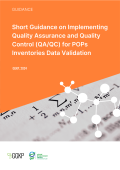
This document serve as a guide to implement a more comprehensive system for the generation and validation of data inventories for persistent organic pollutants.

The Sustainable Fashion Communication Playbook, co-published by UNEP and UN Climate Change, provides a shared vision, principles and guidance on how to align consumer-facing communication across the global fashion industry with sustainability targets.

This guidance includes recommendations for strengthening dialogue with national statistical offices and other responsible institutions to improve and supplement the production of national statistics relevant to POPs data for the review and updating of national implementation plans.

This guidance facilitates the assessment of inventories for POPs within specific sectors and enhances the coordination of information gathering. The goal is to optimize efficiency and cost savings during the inventory development process.

This guidance supports gender mainstreaming in the development of artisanal and small-scale gold mining National Action Plans (NAPs) of the Minamata Convention on Mercury, and National Implementation Plans (NIPs) for the management of POPs in line with the Stockholm Convention.

This report outlines what each stakeholder group can do individually and collectively to reach the shared destination of a circular textile sector.
This guidance assists countries develop a regulatory framework and monitoring concept that can facilitate monitoring of products and articles that contain persistent organic pollutants.
This guidance document is intended to help parties understand and implement their obligations to control of import and exports of persistent organic pollutants restricted by the Stockholm Convention.
This document contains general considerations on benefits of labelling equipment, substances and mixtures containing persistent organic pollutants.
This guide presents a number of considerations to help parties facilitate a calculation of the action plan costs under the Stockholm Convention's national implementation plans.
